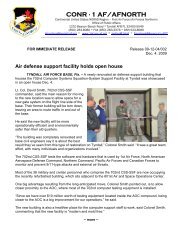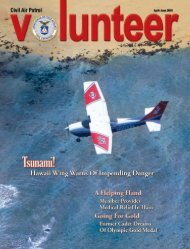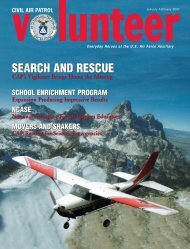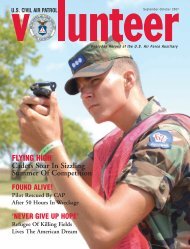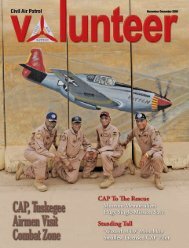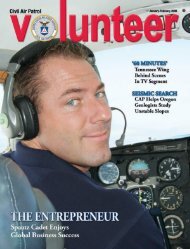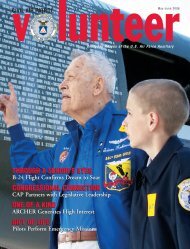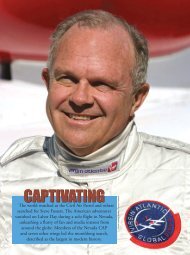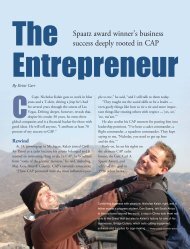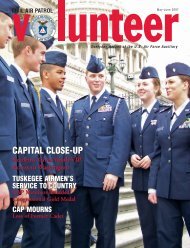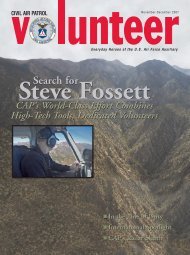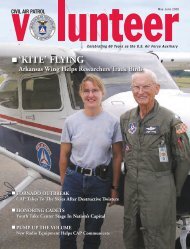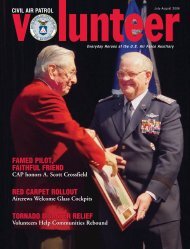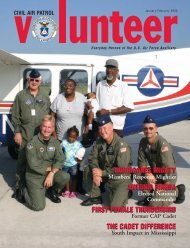GIVING BACK
Hi-res - CAP Volunteer Now
Hi-res - CAP Volunteer Now
- No tags were found...
You also want an ePaper? Increase the reach of your titles
YUMPU automatically turns print PDFs into web optimized ePapers that Google loves.
sunburns. “We argued about cutting up the last oar for<br />
firewood,” Harding continued, “but decided it might be<br />
more useful as a way to reach more grass or to hit an<br />
alligator.” They had quickly discovered that things that<br />
go bump in the night in the ‘Glades include alligators.<br />
Just as the sun began to rise on the third morning of<br />
their ordeal, “We could see helicopters with search lights<br />
skimming the horizon. We dipped the remaining oar in<br />
the gasoline and waved it like a torch to attract attention.<br />
No luck. A few hours later, we saw a small plane<br />
flying back and forth at a low level and getting closer.<br />
Grabbing our remaining sawgrass, we doused it in gasoline<br />
and set it on fire to create smoke. Shortly thereafter,<br />
the plane headed right for us. Jubilant, we waved wildly.<br />
The plane circled once or twice and then left. A few<br />
minutes later it came back, circled us and left.” The boys<br />
were puzzled. “We didn’t know if he knew we were<br />
stranded. Why did he keep leaving? We thought this<br />
pilot was nuts.”<br />
“Eventually,” Harding continued, “the distant circling<br />
got closer and was accompanied by the sound of airboats.<br />
Several minutes later, two<br />
airboats manned by sheriff’s<br />
deputies and park rangers popped<br />
through the grass!” One group<br />
took the boys on board, and the<br />
other brought their boat back.<br />
You can imagine the scene at<br />
the boat ramp as the boys were<br />
greeted by parents and the media.<br />
The only food at the boat ramp<br />
was chips and soda. “We devoured<br />
several bags and cans each. We<br />
were lucky not to be charged for<br />
the extra two days’ rental — or the<br />
oars!” he said.<br />
What did the boys’ ordeal have<br />
to do with the U.S. Civil Air<br />
Patrol? “I had found out in the<br />
ensuing newspaper article that<br />
CAP was responsible for finding<br />
us,” Harding recounted, “so I<br />
looked up the nearest unit (Boca<br />
Raton Senior Squadron) and went to a meeting to say<br />
thanks. Once the commander found out I was a pilot,<br />
the membership paperwork was stuffed in my hand<br />
before I could finish thanking everybody. I had to wait a<br />
month until I was 18 to join, and I have been a member<br />
ever since.”<br />
Over the past 20 years, Harding — now a CAP lieutenant<br />
colonel — has had the opportunity to repeatedly<br />
give back to the organization that once rescued him.<br />
“I have been qualified at some point in most ES mission<br />
specialties,” he said. “I’m a chief check pilot and<br />
mission pilot. I’ve completed the new glass cockpit<br />
training from Cessna, the (Gippsland) GA8 Airvan<br />
training and ARCHER training.”<br />
He flew missions during the Katrina and Rita hurricanes,<br />
and is often involved in ARCHER missions at<br />
Eglin Air Force Base, Fla.<br />
Harding said he still enjoys fishing, and might even<br />
fish the ‘Glades again one day — but not without his<br />
cell phone and a handheld Global Positioning System<br />
device! ▲<br />
Lt. Col. Michael Harding, third from left, gives flying tips to Florida Wing cadets, from left,<br />
Staff Sgt. John Clark, 2nd Lt. Michael Lima and Maj. Christina Zarrilli. Harding joined CAP<br />
after an aircrew spotted him in the Everglades in 1985 after being stranded for three days.<br />
U. S. Civil Air Patrol Volunteer 9 July-August 2007



